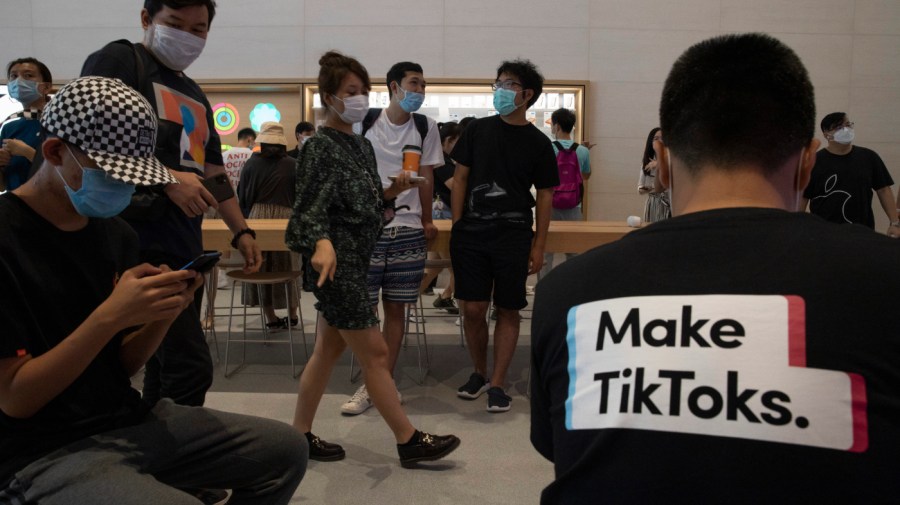TikTok can shape America’s next generation and Beijing knows it

If Washington doesn’t act urgently, content pushed by TikTok and consumed by young Americans will result in future U.S. leaders unwittingly parroting China’s talking points, advocating warped views and, most dangerously, acting in ways that are in Beijing’s interests but undermine U.S. national security.
There is admittedly no “smoking gun,” but TikTok represents a highly plausible vector of intelligence collection. ByteDance, TikTok’s parent firm, claims it is committed to U.S. national security, but is legally bound to cooperate with the Chinese Communist Party.
The People’s Republic of China almost certainly uses TikTok, at a minimum, as a collection platform to monitor public opinion. The Committee on Foreign Investment in the U.S. and TikTok agreed in January 2023 to maintain all U.S. data within the U.S., but there are concerning reports of leaks.
With 170 million U.S. users, TikTok provides Beijing with real-time, granular insight into American public opinion. That real-time data collection would prove enormously useful, for instance, in assessing U.S. willingness to fight in a hypothetical conflict over Taiwan.
But the challenge from TikTok with America’s youth is not just collection, but influence. Early evidence suggests this is already underway.
A Rutgers study found TikTok suppressed unfavorable accounts of sensitive topics, including Tibet, Tiananmen Square, Uyghur rights and Xinjiang. “Heavy” users expressed elevated positive attitudes toward China’s human rights record and greater interest in traveling to China.
Given that the company’s black box algorithm thwarts independent verification, we likely have seen only the tip of the iceberg of Beijing’s efforts to sway the U.S. public.
The algorithm could convulse U.S. domestic politics by sowing discord and highlighting divisions, an outcome that serves Beijing’s interest in undermining U.S. cohesion and painting D.C. as an unreliable partner.
Indeed, rather than bolstering one candidate or another, TikTok may act as an anti-incumbent tool.
In the 2024 election, TikTok contributed to President Biden’s low approval ratings, according to one Democratic strategist. In that election, President Trump’s support among 18-29-year-olds, which disproportionately comprises TikTok’s user base, rose by seven points from 2020.
And yet, by April, only three months into office, Trump’s support among young people has declined markedly — by up to 27 points.
While there are admittedly many variables at play, TikTok can amplify alienation and short-term sentiment swings. Whatever one’s politics, it’s dangerous for China to retain levers that can subtly shape American public opinion, especially by amplifying dissatisfaction.
It’s worth noting that as Beijing uses tools to manipulate the U.S. public, especially its youth, it’s taking meaningful steps to protect its own young people.
Douyin, the version of TikTok used in China and also owned by ByteDance, is required by authorities to enforce a “youth mode,” limiting users under 14 to app usage for just 40 minutes a day. It also locks them out between 10 p.m. and 6 a.m. daily.
The contrast is stark: China exports attention-fracturing content while shielding its own youth from it.
China’s use of TikTok may allow it to influence mass and elite opinion. And in fact, TikTok may be uniquely effective at influencing elite views, by enabling microtargeting.
Given TikTok’s effectiveness and deniability, as well as Beijing’s determination to supplant the United States, Chinese security services are likely tweaking TikTok’s algorithms to micro-target key users.
Chinese security services can directly shape TikTok’s algorithm — rather than merely exploit one built by others — giving it a deniable, end-to-end influence over what users see.
Crucially, any elite-focused information operation via TikTok would be even more difficult to detect in the unclassified domain than efforts to shape mass public opinion because of how narrow and precise the targeting would be.
For far too long, U.S. leaders on both sides of the aisle have failed to take action against the platform.
And the reported decision by President Trump to tell U.S. companies they can ignore the law barring American companies from engaging with TikTok represents a new and immediate danger to U.S. national and economic security.
At a minimum, it is imperative to ensure the U.S. is not allowing companies or individuals to engage with TikTok so long as its algorithm is controlled by a Beijing-linked company.
But U.S. policymakers need to go even further and consider, for example, more ambitious measures such as national limits on short-video screen time for minors.
The status quo is incomprehensible and dangerous: Young Americans are being asked to unwittingly face off against an algorithm that may be a tool of Chinese intelligence services.
Allowing this dynamic to persist risks eroding the cognitive, civic and strategic foundations of American leadership.
Jonathan Panikoff is a senior fellow in the Atlantic Council’s GeoEconomics Center and the former director of the Investment Security Group, overseeing the intelligence community’s CFIUS efforts at the Office of the Director of National Intelligence. Joseph Webster is a senior fellow at the Atlantic Council and editor of the independent China-Russia Report.